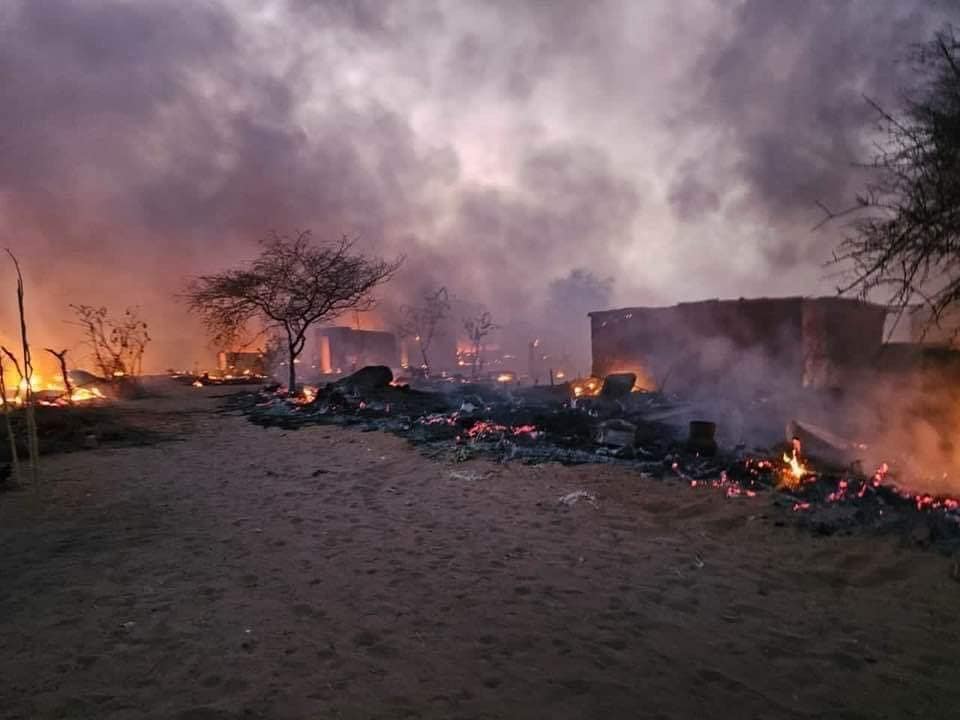RSF claims control of North Darfur capital El Fasher

Aftermath of SAF-RSF fighting in El Fasher, North Darfur, taken on May 23, 2024 (File photo: El Fasher Resistance Committees via Facebook)
The paramilitary Rapid Support Forces (RSF) announced that after capturing the headquarters of the Sixth Infantry Division, one of the Sudanese Armed Forces’ (SAF) key bases in western Sudan, they had taken full control of El Fasher, the capital of North Darfur, on Sunday.
The RSF described the seizure as a “pivotal victory” in its campaign against the SAF, pledging in a statement to “protect civilians” and “facilitate the return of displaced people to their homes”.
Videos shared on RSF platforms showed commanders addressing their troops inside the captured base, including RSF Deputy Commander Abdelrahim Dagalo, brother of the group’s leader Mohamed ‘Hemedti’ Dagalo, celebrating what he described as the “liberation” of the city.
Additional footage also emerged, showing RSF troops advancing through streets in El Fasher and staging victory processions in Nyala, South Darfur, after declaring the capture of Bara in neighbouring North Kordofan.
The town, situated around 40 kilometres from the capital of El Obeid, serves as a vital crossroads linking western Sudan with the country’s central and eastern regions. Military sources confirmed that army units pulled back from Bara on Saturday following sustained RSF offensives.
UN Under-Secretary-General for Humanitarian Affairs, Tom Fletcher, voiced grave concern over reports that RSF fighters had deepened their incursion into the city and blocked escape routes, urging an immediate ceasefire, full humanitarian access, and safe passage for civilians attempting to flee.
‘SAF and allies reject RSF claims’
Both the SAF and Popular Resistance Committees in North Darfur swiftly denied the RSF’s claim of full control, insisting that army units continue to hold several fortified positions across El Fasher.
“The entry of the Rapid Support Forces into the Sixth Division’s headquarters does not mean control of the city,” the Popular Resistance said in a statement, stressing that local fighters were still resisting.
Videos circulated online showed army-aligned troops pledging to continue “defence and response operations”. Members of the El Fasher Resistance Committees accused unnamed officials of deliberately cutting off supplies and air support “to hand the city over to the RSF”.
They condemned the “negligence and cowardice” of local authorities, vowing that El Fasher “will not be served up as a dish on negotiating tables”. The group affirmed that SAF troops had vacated the division headquarters over a year ago, describing it as “an empty shell with no military value”.
Civilian toll
Heavy shelling continued across El Fasher throughout the weekend. The Sudan Doctors Network reported yesterday, that a nurse was killed and three medical workers injured when RSF fire struck El Fasher Hospital on Sunday morning.
The North Darfur Emergency Rooms Council accused the RSF of committing what it called “human genocide”, warning that civilians are paying the highest price. The council described the attacks as war crimes, holding the international community “historically responsible for its silence” and urging human rights groups to act beyond issuing statements.
A joint UN statement released last week by UNHCR, UNICEF, IOM, and the World Food Programme warned that 260,000 civilians, including 130,000 children, remain trapped in El Fasher after more than 16 months of siege.
Many are cut off from food, water, and medical assistance, while reports of killings, sexual violence, and forced recruitment continue to rise.








 and then
and then